Introduction
Enums are a fundamental aspect of OpenAPI that play a crucial role in establishing clear and well-defined parameters for properties. By outlining a definitive set of permissible values, enums create a boundary that prevents the entry of invalid data, promoting consistency and accuracy. In the context of GitHub's expansive platform, the strategic use of enums in their data-driven documentation ensures clarity and consistency across their extensive documentation, benefiting over 100 million users.
Enums also contribute to the overall efficiency and productivity of API design by mitigating the risk of ambiguity and reducing the potential for errors. In this article, we will explore the importance of enums in API definitions, how to define enums in OpenAPI, best practices for using enums in API design, common use cases, challenges and considerations, version-specific enum definitions, tools and extensions for enum support, and error handling and validation with enums. Join us as we delve into the world of enums and discover their significant role in achieving maximum efficiency and productivity in API development.
What are Enums in OpenAPI?
Enums in OpenAPI serve a pivotal role by delineating a definitive set of permissible values for a property, essentially establishing a clear boundary that precludes the entry of invalid data. This is particularly advantageous in the context of GitHub's expansive platform, which relies on precision and well-defined parameters to facilitate the integration and management of a myriad of functionalities for over 100 million users.
GitHub's transition to a dynamic application in 2020, spotlighted on their blog, underscores the significance of data-driven documentation, where enums are instrumental in ensuring consistency and clarity across their extensive documentation. By predefining permissible values, enums mitigate the risk of ambiguity and reduce the potential for errors that can emanate from manual data ingestion, a challenge highlighted in discussions about the limitations of Spotify's Backstage platform.
Moreover, as APIs continue to evolve, the deprecation of outdated conventions, such as the prefixing of unstandardized parameters with 'X-', reflects a shift towards more rational and practical standards. This evolution, emphasized in RFC 6648, aligns with the broader industry trend of moving away from so-called 'best practices' that no longer serve their intended purpose.
The strategic use of enums in API documentation exemplifies GitHub's commitment to delivering robust and maintainable systems, a principle echoed by industry experts who advocate for the development of APIs that prioritize reliability, efficiency, and scalability. In this environment, enums are not just a technical specification; they embody the drive towards optimized processes that align with the ever-changing landscape of software development.
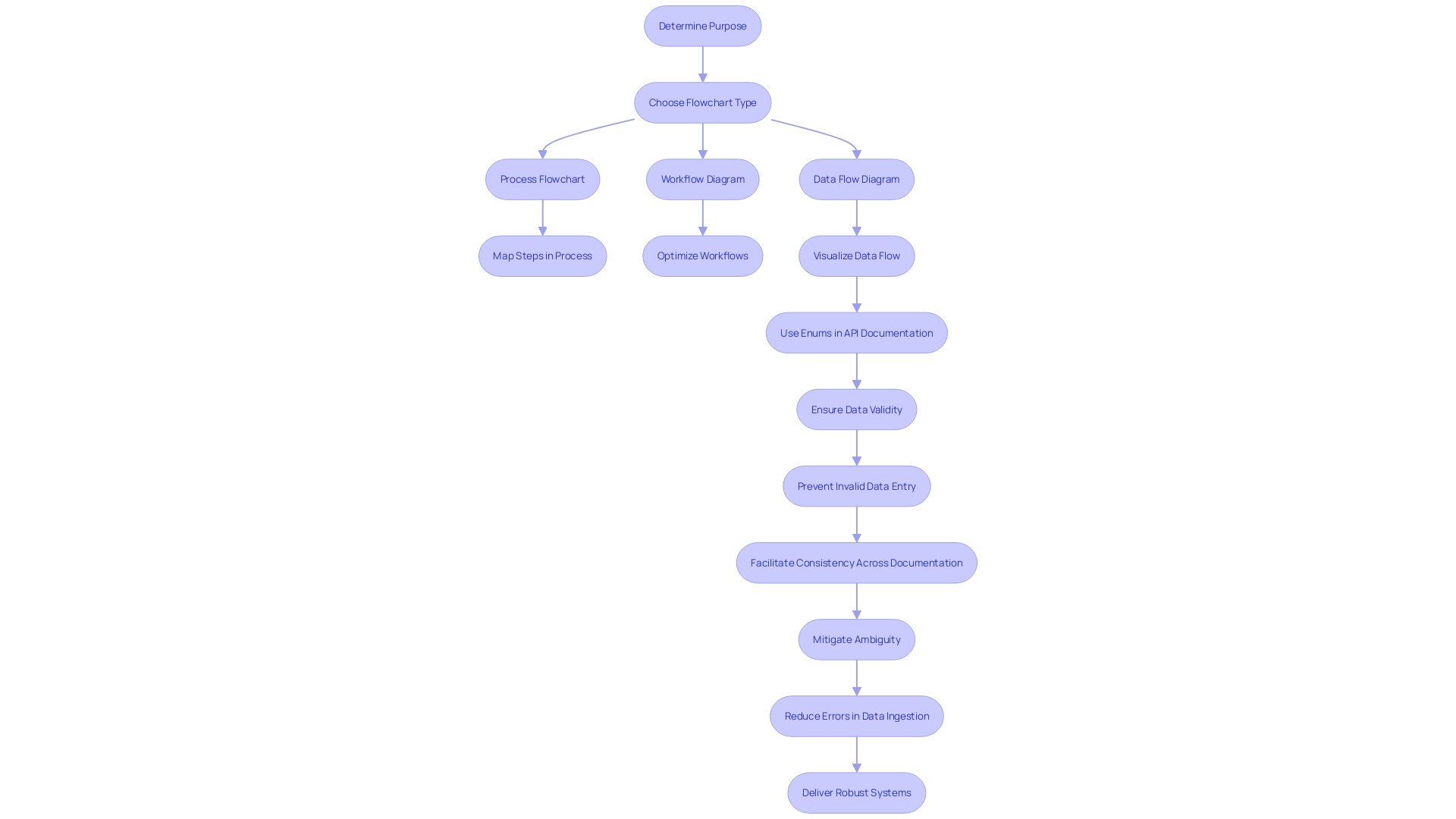
Importance of Enums in API Definitions
Enums, akin to the diplomatic channels in software applications, are vital for establishing clear communication in API development. They represent a predefined list of possible values for a given property, serving as the 'nouns' of your API. This precision in defining acceptable values for fields is instrumental in avoiding ambiguity, reducing error rates, and clarifying the API contract for consumers.
A practical example of their significance can be seen in GitHub's approach to documentation. With a vast array of functionalities to document, the adoption of data-driven documentation using JSON has been key in GitHub's strategy to manage the complexity of their APIs and ensure clarity for users. Furthermore, with the increasing prevalence of APIs in powering web applications and the associated rise in security breaches, the role of enums and precise API definitions becomes even more critical.
Breaches often involve unauthorized access to sensitive data which can have devastating consequences. In such a landscape, enums contribute to a more secure and predictable API by clearly defining the scope of interaction between different software components, thus mitigating potential vulnerabilities. Statistics underscore the urgency of robust API practices: 78% of cybersecurity teams have experienced an API-related incident in the past year.
With 81% of professionals acknowledging the growing priority of API security, the role of enums and other definitive structures in API design is undeniably crucial for the safety and efficiency of modern software development.
How to Define Enums in OpenAPI
When defining enumerations (enums) in OpenAPI, the process is precise and systematic. Within the property definition, one utilizes the 'enum' keyword to list permissible values. These values, which can consist of strings, numbers, or booleans, are individually wrapped in double quotes and delineated by commas.
This method provides a clear, structured way of indicating all the valid options for a property, ensuring that the API's data is both structured and understandable, facilitating easier integration and interaction between systems.
OpenAPI's approach to enums is similar to the thoughtful construction of error handling in APIs, where clarity and actionability are paramount. Instead of a chaotic mix of error formats, a standardized method, as seen with OpenAPI enums, brings consistency and reduces the complexity of development, allowing for better communication between different software components. This structured communication is crucial in a digital environment proliferated by APIs, where seamless interoperability is the goal.
APIs function as the building blocks of modern software, acting as a bridge for applications to exchange data. With the correct definitions in place, like enums in OpenAPI, APIs become more robust and reliable, contributing to the overall efficiency and productivity of the development process. The strategic design of API elements, such as enums, reflects a commitment to an API-first mindset, where the developer's experience is a priority, and the goal is to unlock automation and foster an ecosystem of innovation.
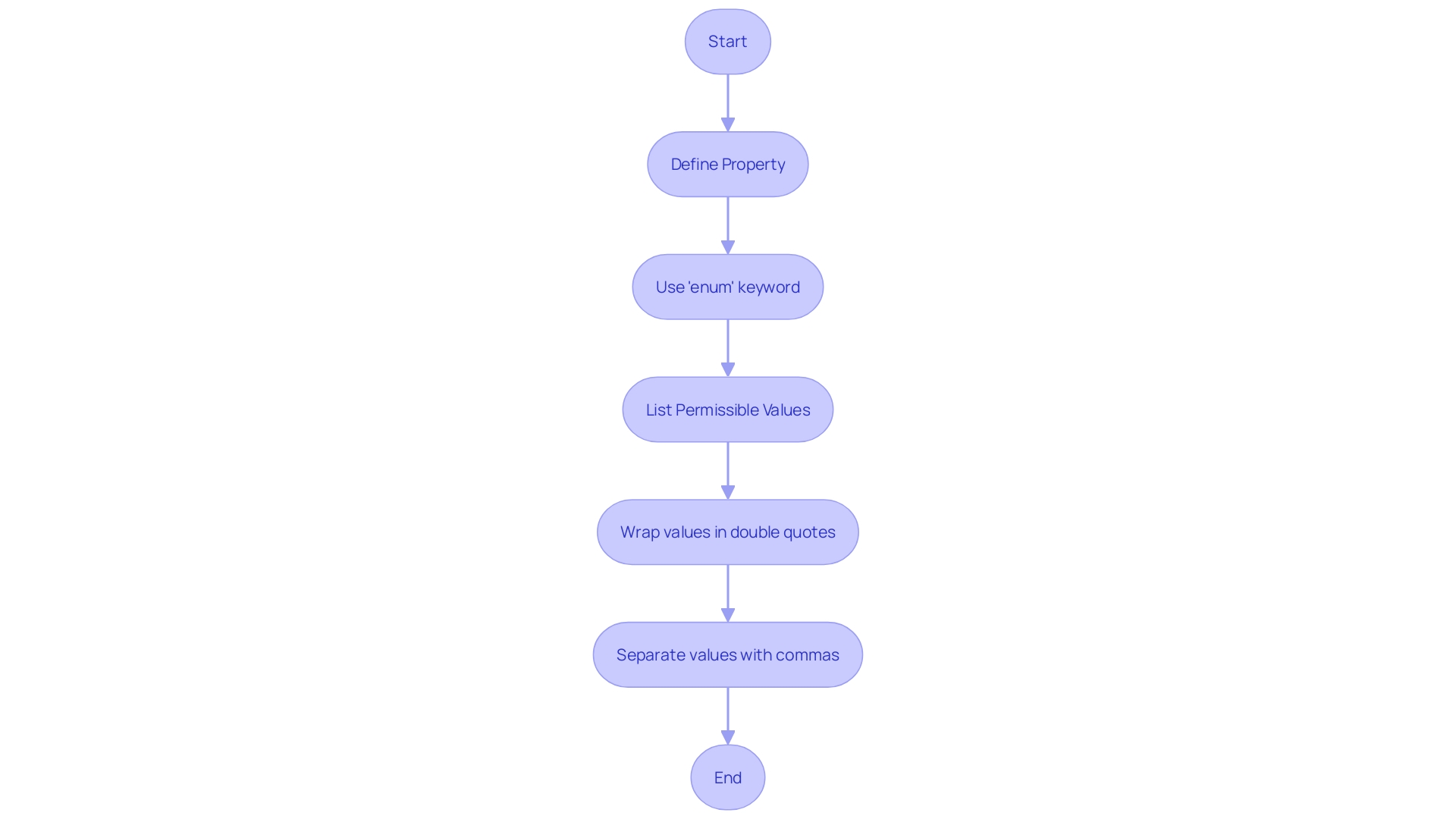
Best Practices for Using Enums in API Design
When crafting enums for API design, it's crucial to ensure they convey clear and precise meanings, serving as a guidepost for developers. Enum values should be intuitive, leaving no doubt about the options they represent. For properties that utilize enums, setting a default value can be a smart move to manage instances where a consumer might not specify a value, thus maintaining a predictable behavior for your API.
Furthermore, precise documentation of your enums is indispensable, providing developers with the necessary insights to leverage your API to its full potential. This includes not just listing the enum values, but also explaining their relevance and application within the context of the API.
By following these guidelines, you'll create an environment where developers can work with your API with confidence, knowing they have the knowledge and tools at their disposal to integrate it seamlessly into their own projects. And as APIs are the linchpins of modern software development, facilitating clear and effective communication between disparate systems, your attention to detail in enum design and documentation contributes significantly to the efficiency and reliability of the digital ecosystem.
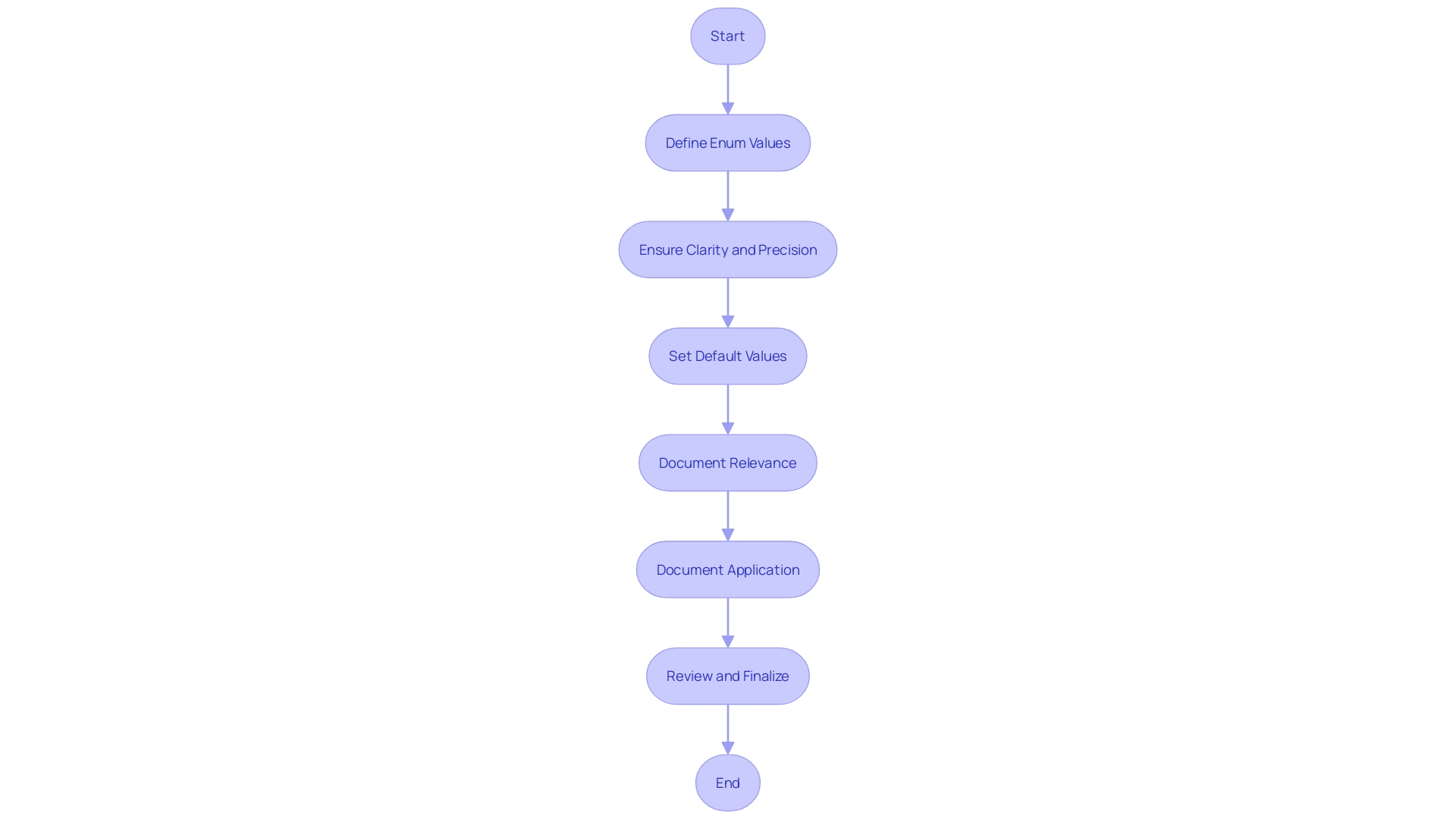
Common Use Cases for Enums
Enumerations (enums) serve as a pivotal feature in API design, facilitating clear and consistent communication between software components. By defining a finite set of possible values, enums ensure that properties such as order status—with options like 'pending', 'shipped', and 'delivered'—are unequivocally understood and processed. This clarity is essential, as demonstrated by Nick Tune's experience with Lufthansa, where the term "Flight" had multiple interpretations, leading to confusion.
Similarly, when modeling complex domains such as "Accounts", which can have vastly different meanings across departments, enums help establish a shared language, avoiding the ambiguity that can arise from departmental perspectives, such as sales seeing an account as a customer, while finance sees it as a billing entity.
In the context of API-First Development, a paradigm where APIs serve as foundational building blocks for application design, enums contribute to the robustness of APIs. They offer a controlled vocabulary for interactions, whether it's specifying authentication methods or categorizing data, thus enhancing the API's ability to serve as a reliable interface for data retrieval and application functionality. As the software landscape continues to evolve, the role of enums in API design becomes increasingly significant, promoting a more structured, reliable, and interpretable way of defining and interacting with software components.
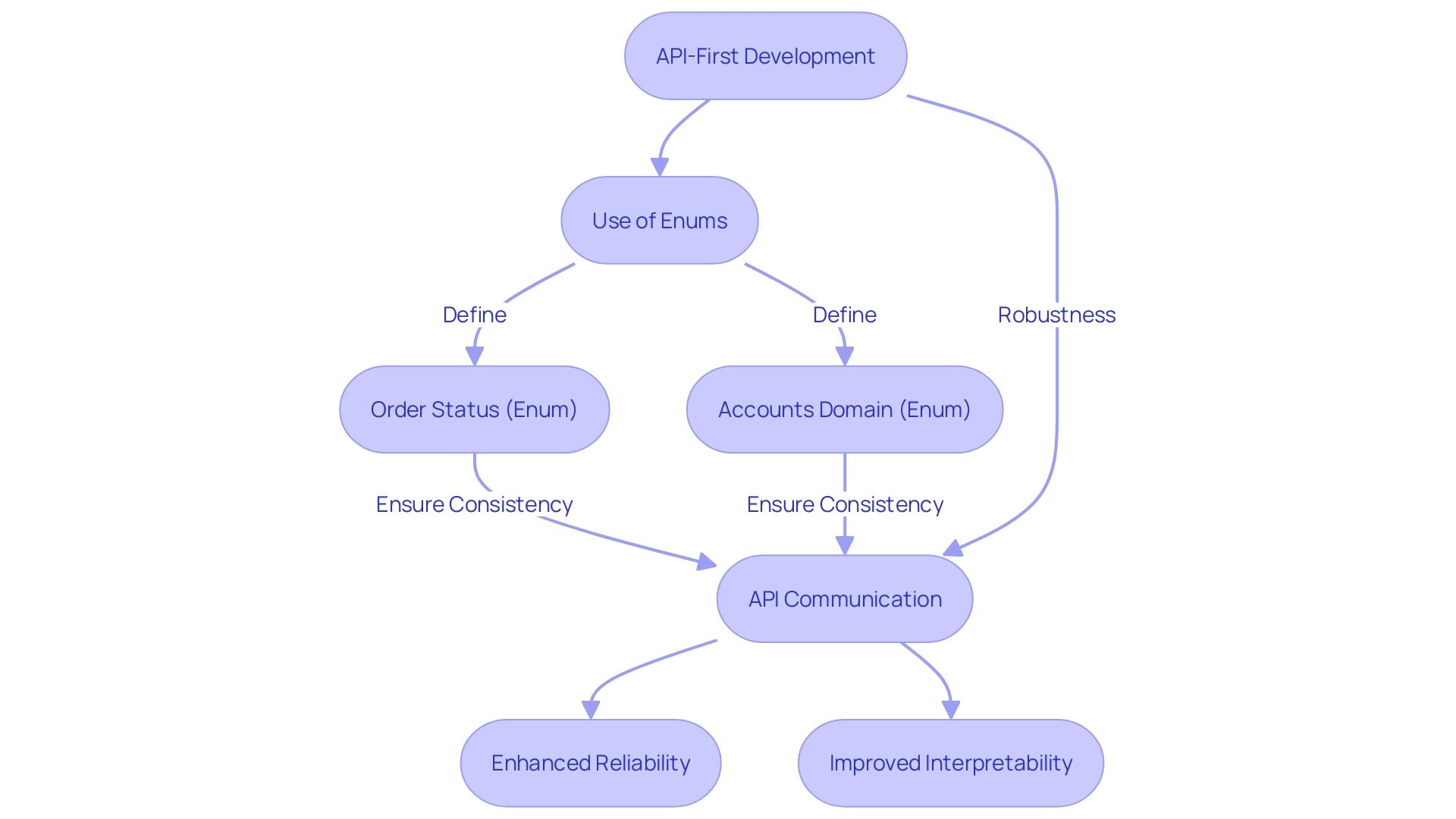
Challenges and Considerations with Enums
Understanding the implications of enums in API design is essential. While they can serve to clarify and constrain the values for a particular field, they come with their own set of challenges that can affect the overall API architecture. For example, a change in enum values could necessitate updates to the API contract, potentially causing issues with backward compatibility.
This is a delicate balance, as highlighted by a project at Lufthansa, where the term "Flight" had multiple meanings, none of which were explicitly defined, leading to confusion and complexity in software modeling.
Furthermore, enums can inadvertently bulk up the payload of API responses, particularly when the values are verbose or intricate. This was evident in the domain of "Accounts" as seen in professional environments, where differing departmental views—like Sales seeing an account as a customer, while Finance considers it a billing entity—can complicate the API's structure and responses.
In addition to these considerations, it's paramount to ensure robust handling of invalid or unsupported enum values provided by API consumers. Any oversight can lead to unpredictable behavior or errors, thereby compromising the API's reliability. This concept aligns with the broader discussion on the importance of comprehensive and modular API education, as suggested by industry leaders who call for an open-source glossary and curriculum to standardize API knowledge.
As APIs continue to be the backbone of software interoperability, the responsibility to create clear, efficient, and effective API documentation and design becomes increasingly critical. This includes navigating the complexities of enums within the API framework, an undertaking that underscores the necessity of an API-first development approach, which prioritizes API design and documentation from the outset.
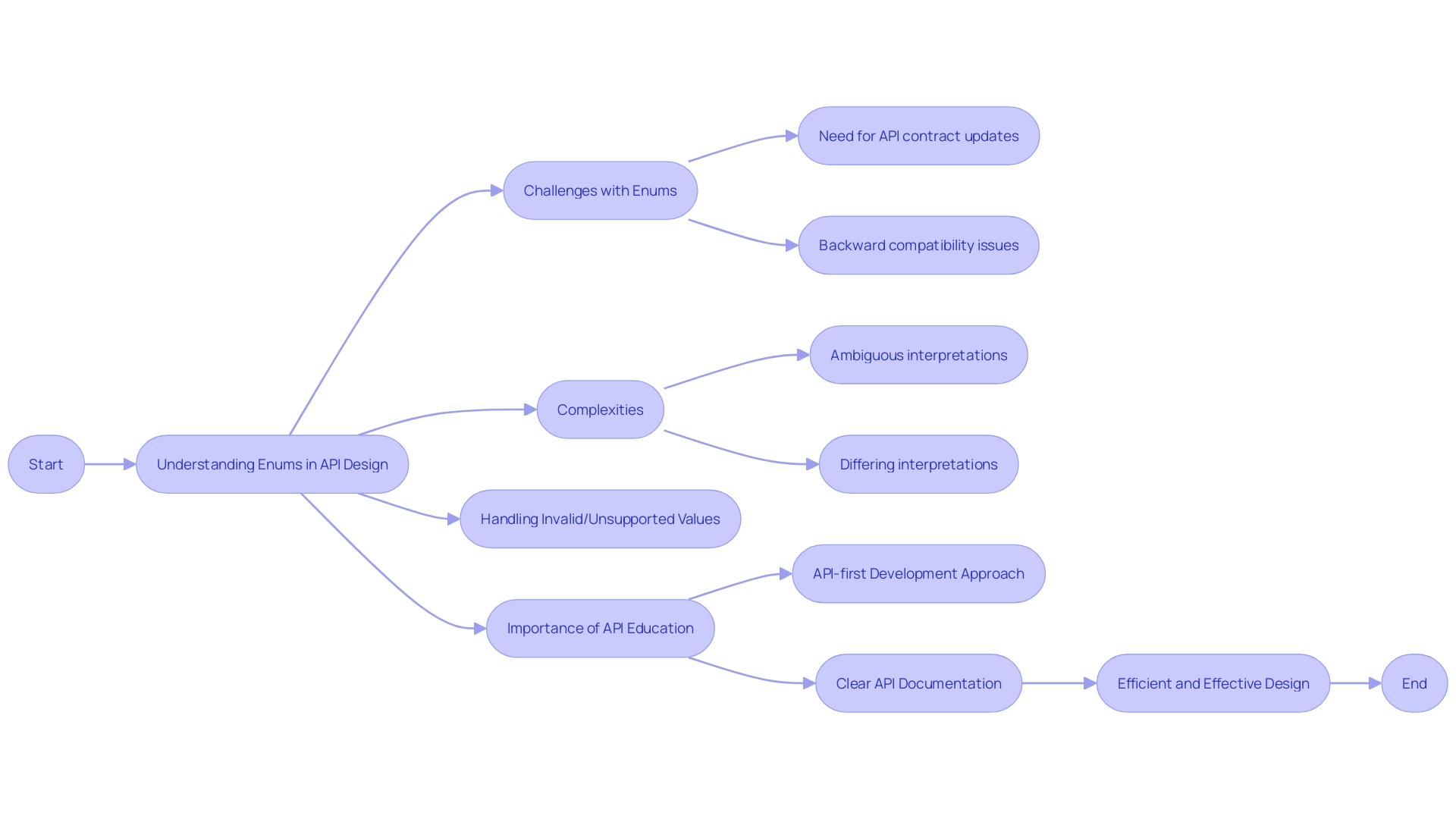
Enumerations with Names and Values
Implementing enums in OpenAPI provides a robust mechanism for defining a set of named values, each associated with a unique enumerator. This structured approach ensures that when developers encounter an enum, they're equipped with both the context and the specific value, facilitating seamless integration across various programming languages and frameworks. By leveraging enums with explicit values, developers can prevent ambiguities and improve the consistency of data types exchanged between different parts of a system.
The evolving landscape of technology underscores the need for adopting common, straightforward constructs that remain applicable over time. As we've seen with GraphQL's use alongside complex client libraries like Apollo, the objective is to simplify data handling, state management, and caching, albeit with a trade-off in payload size. Similarly, the precision in API documentation, such as defining enums, becomes critical to avoid confusion over parameters' intent and ensure clarity on data requirements for endpoints.
Recent advancements in AI, particularly in Prompt Engineering, demonstrate how refining our interactions with technology can significantly enhance its utility. This parallels the importance of meticulously crafting API documentation, where clear definitions like those for enums can markedly improve the developer experience and the effectiveness of the API.
The complexity of domains like 'Accounts', as experienced in various sectors like sales, marketing, and finance, exemplifies the need for distinct naming conventions in API modeling. As we build upon our OpenAPI workflows, it's essential to consider how these definitions are perceived across different departments and life cycles. In the pursuit of API excellence, it's not just about enabling data flow; it's about ensuring that flow is intuitive, reliable, and scalable to meet the demands of today's interconnected applications.
Version-Specific Enum Definitions (OpenAPI 3.0, 3.1)
The evolution of API specifications, especially with OpenAPI 3.1, has greatly enhanced the way developers define and manage enum values. Enums are crucial for defining a set of named constants, which makes the code more readable and less error-prone compared to using literal strings or numbers. With OpenAPI 3.0, enums could be defined at the schema level, but the introduction of OpenAPI 3.1 has taken this a step further by allowing version-specific enum definitions.
This feature gives developers the ability to tailor enum values to specific API versions, thus offering a more flexible and controlled approach to API evolution.
As software evolves due to business needs or regulatory changes, maintaining backward compatibility is essential to prevent breaking changes that could disrupt client applications. Backward-compatible changes, such as adding parameters, can be seamlessly integrated without affecting existing client functionality. For instance, adding an optional property like number of Students to an interface is straightforward and does not impact old clients, while new clients can utilize the added feature.
In practice, the Internal Developer Platform (IDP) team at Workleap, for example, focuses on creating .NET class libraries without introducing breaking changes. By drawing on various methodologies, they ensure that the libraries are reliable for other teams within the organization. Similarly, in the context of API documentation and tooling vendors, there's a consistent effort to maintain a balance between introducing new features and ensuring stability.
According to Vanson Bourne's 2021 research, 'The State of APIs, Integration, and Microservices,' 93% of organizations recognize the relevance of APIs to their operations, with 86% acknowledging that APIs prevent the formation of silos. This underlines the critical role that APIs play in modern software integration and the importance of careful management of API changes. With the latest updates in OpenAPI specifications, developers now have better tools at their disposal to manage these changes effectively and responsibly.
Tools and Extensions for Enum Support
OpenAPI, the backbone of modern API design, becomes even more powerful with the right tools and extensions that enhance its enum support. Tools like Swagger UI, ReDoc, and OpenAPI Generator are akin to a developer's diverse kitchen, where each appliance serves a specific purpose, streamlining the creation of gourmet-grade API documentation. These tools not only generate documentation but also validate enum values and assist with code generation, offering a plug-and-play ease that supports a data-driven documentation approach similar to GitHub's dynamic docs.github.com.
As developers navigate through the complexities of API workflows, the integration of such tools can significantly reduce the steep learning curve associated with mastering different platforms. By leveraging these extensions, teams can avoid the inefficiencies of 'switching kitchens' and maintain a consistent quality across the development lifecycle. This is particularly crucial given that, according to a 2023 survey, a substantial number of the 34,493 software developers who responded use C++ as one of their primary languages, an area where robust API documentation is key for effective collaboration and integration.
Moreover, the industry is witnessing a continuous evolution in programming languages, with Rust gaining popularity and Objective-C on the decline. Amidst these shifts, the tools that support OpenAPI play a pivotal role in ensuring that developers remain agile and capable of adapting to new trends. They serve not just as facilitators of day-to-day tasks but also as gateways to innovation, as emphasized by the enthusiastic adoption and social contribution by companies like Adobe, JetBlue, FedEx, and Microsoft.
In summary, as we strive for efficiency in a technology-driven world, the harmonious blend of OpenAPI with these tools and extensions is not just a convenience but a necessity for developers who aim to master their APIs and deliver exceptional software.
Error Handling and Validation with Enums
In developing robust API systems, acknowledging and planning for the inevitability of errors is as crucial as designing the API itself. Enum values are a common source of confusion and can lead to unpredictable behavior if not properly validated. Enum validation is not just about ensuring that the values are correct; it's about safeguarding the user experience.
An API that can gracefully handle errors by providing clear, actionable messages when an invalid enum value is encountered can be the difference between a frustrated user and a minor hiccup in their workflow.
According to a seasoned developer, "We want efficiency, we want to be able to open our favorite app, perform an action, and finalize our transaction swiftly. Nobody wants to deal with issues just to accomplish a simple task; it's detrimental to the overall customer experience." This sentiment is echoed in the reality that despite the internet's inherent unpredictability, users expect APIs to deliver seamless interactions.
By classifying errors based on their potential impact—planned or unplanned—we can create a system that doesn't just throw an error but provides guidance towards resolution or, at the very least, a clear explanation.
Recent discussions in the software development community highlight the importance of error clarity. A common error rate ratio metric used for service monitoring emphasizes the need to keep error occurrences in check relative to all operations. In the modern web's environment, where every data transfer can introduce errors, APIs must be equipped with mechanisms that make these errors not only clear and understandable but also resolvable.
In essence, while developers might gravitate towards coding the 'happy path,' it is the meticulous attention to handling exceptions that truly refines an API's quality. By integrating thoughtful error responses and validating enum values with precision, APIs become more than just functional; they become resilient, user-friendly, and reliable components of the digital infrastructure.
Conclusion
Enums are fundamental in OpenAPI for establishing clear parameters, promoting consistency, and reducing errors. GitHub's use of enums in their documentation ensures clarity and benefits millions of users. Enums enhance API design efficiency and productivity.
Enums serve as vital communication channels in API development, avoiding ambiguity and enhancing security. They define the scope of interaction between software components, mitigating vulnerabilities.
Defining enums in OpenAPI follows a precise approach, indicating valid options and facilitating seamless integration. This makes APIs more robust and reliable.
Best practices for using enums include clear meanings, default values, and comprehensive documentation. This enhances efficiency and reliability in the digital ecosystem.
Enums facilitate clear communication between software components, enhancing API robustness.
While enums bring benefits, challenges include maintaining compatibility and handling invalid values. An API-first approach ensures efficiency and reliability.
Tools and extensions support enum functionality, streamlining API documentation and code generation. They enhance efficiency in API development.
Proper error handling and validation with enums create resilient and user-friendly APIs.
In conclusion, enums are essential for efficient and productive API development. They establish boundaries, promote consistency, and reduce errors. Following best practices, utilizing tools, and implementing proper error handling enhance API success.
Boost your API design efficiency and productivity with Kodezi!
Frequently Asked Questions
What are Enums in OpenAPI?
Enums in OpenAPI are a set of predefined values that establish the allowed values for a property. They help to prevent invalid data entry by clearly defining what is acceptable for that particular property.
Why are Enums important in API definitions?
Enums are important because they provide clear communication by defining acceptable values for fields. This reduces ambiguity, error rates, and clarifies the API contract for consumers, contributing to a more secure and predictable API.
How do you define Enums in OpenAPI?
Enums are defined using the 'enum' keyword within the property definition of the OpenAPI document. The permissible values are listed and separated by commas, and can be strings, numbers, or booleans.
What are some best practices for using Enums in API design?
Best practices include ensuring enum values convey clear and precise meanings, setting default values for properties with enums, and thoroughly documenting your enums to provide developers with the necessary insights to effectively use your API.
Can you provide common use cases for Enums?
Enums are often used to define a finite set of options for a property, such as order status with values like 'pending', 'shipped', 'delivered', or to establish a shared language in complex domains like "Accounts" to avoid ambiguity across different departments.
What are some challenges and considerations when using Enums in API design?
Challenges include managing changes in enum values, which could affect backward compatibility, and ensuring that enum values don't overly increase the payload size. It's also essential to robustly handle invalid or unsupported enum values provided by API consumers.
What are Enumerations with names and values?
Enumerations with names and values are a way to define a set of named constants in OpenAPI, providing both context and specific value to developers, which helps prevent ambiguities and improves consistency in data types exchanged.
How have Enum definitions evolved in OpenAPI 3.0 and 3.1?
OpenAPI 3.1 has enhanced the way enums are defined by allowing version-specific enum definitions, giving developers more flexibility to tailor enum values to specific API versions and better manage API changes.
What tools and extensions are available for Enum support in OpenAPI?
Tools like Swagger UI, ReDoc, and OpenAPI Generator assist with documentation generation, enum value validation, and code generation, streamlining API development and ensuring consistency across the development lifecycle.
Why is error handling and validation important with Enums?
Proper error handling and validation are critical to prevent confusion from invalid enum values and to provide a better user experience. An API that can provide clear, actionable messages for errors related to enums contributes to a smoother workflow and user satisfaction.




